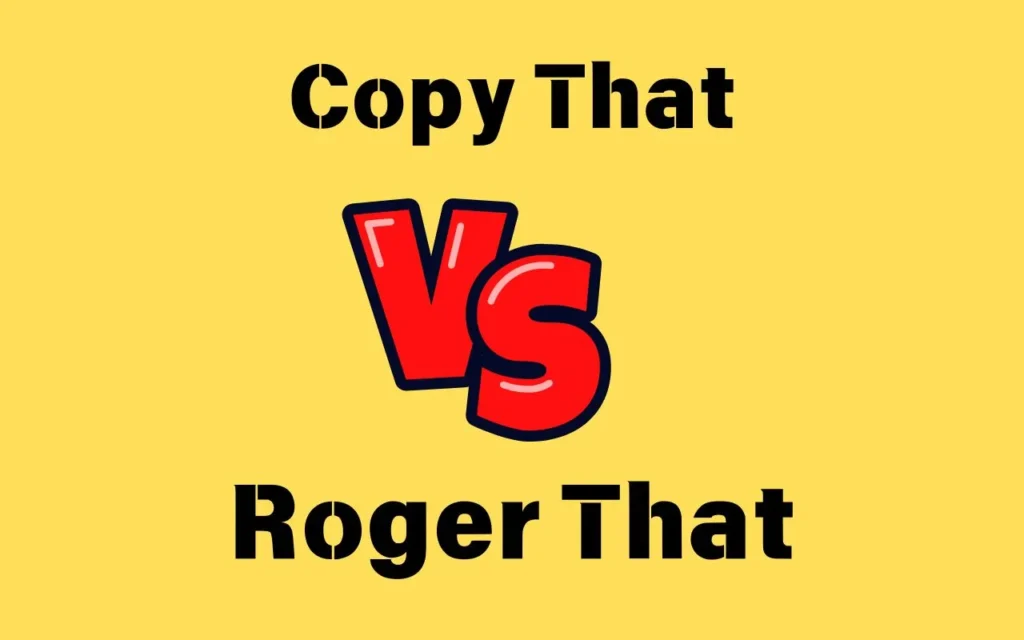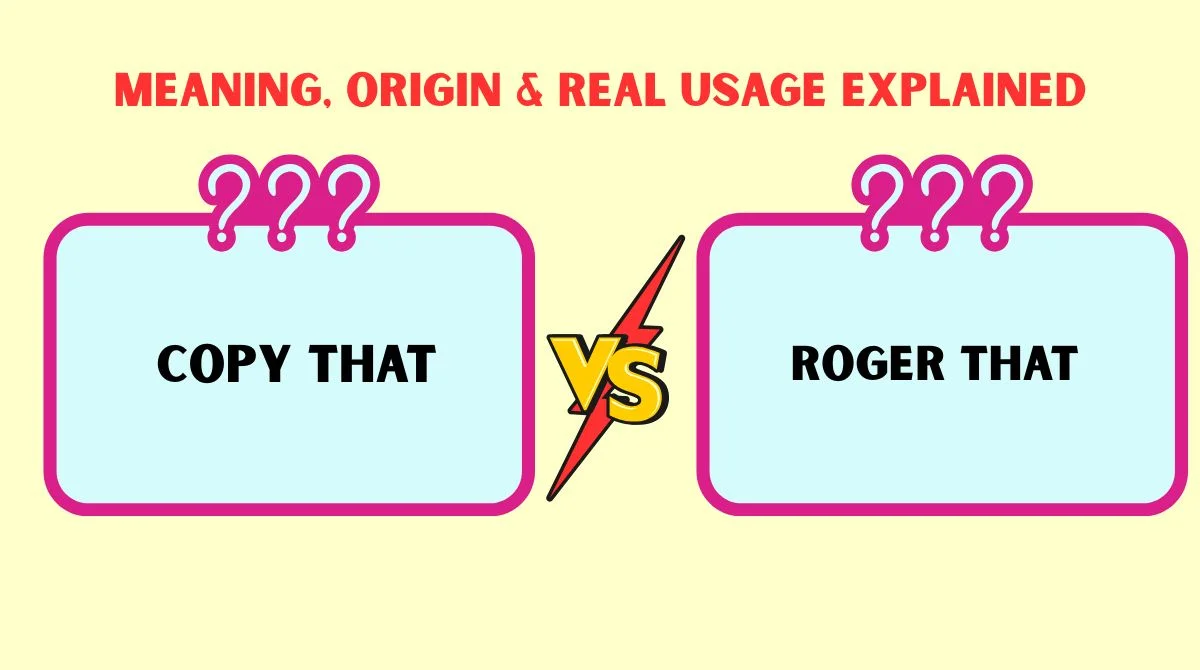Last updated on September 26th, 2025 at 01:47 pm
When someone says “Copy That” or “Roger That”, you instantly know they’re acknowledging a message. But are these phrases really the same? Not exactly.
While both express understanding, their roots and nuances reveal subtle differences. To make sense of this, let’s break down their origins, meanings, and real-world usage.
This article digs deep into Copy That vs Roger That, explores military communication protocols, and shows you when and how to use each phrase naturally in everyday conversation.
Understanding “Copy That”

Meaning and Use
“Copy That” means “I received and understood your message.” It’s short, clear, and practical. The phrase is often used in radio communication where brevity is critical.
- Copy in this context comes from “to copy down a message,” just like a radio operator would jot notes during transmission.
- That refers to the specific message received.
In modern usage, you’ll hear people say it casually, almost like saying “Got it” or “Understood.”
Example:
Pilot: “Flight 271, maintain altitude 10,000 feet.”
Copilot: “Copy That.”
Here, “Copy That” confirms both receipt and comprehension.
Origin
The phrase grew out of 20th-century military and aviation communication. Early radio signals were often noisy and hard to hear. Operators needed a quick, unmistakable acknowledgment word.
“Copy” was perfect: short, distinct, and easy to catch even in static. When paired with “That,” it became a concise acknowledgment tool.
Everyday Use
In civilian life, “Copy That” has shifted into casual slang. You might hear:
- At work: “Meeting moved to 3 PM.” → “Copy That.”
- Among friends: “Pick me up at 7.” → “Copy That.”
- In texting: “Bring chips for the party.” → “Copy That.”
It’s professional yet relaxed, which is why you see it in office chats, police shows, and even workplace jargon.
Examples in Conversation
- In the office:
- Manager: “Deadline’s tomorrow at noon.”
- Employee: “Copy That, I’ll send the draft.”
- In casual talk:
- Friend: “We’re meeting at Jake’s place.”
- You: “Copy That.”
- In emergency services:
- Dispatcher: “Unit 4, proceed to Main Street for traffic control.”
- Officer: “Copy That.”
Understanding “Roger That”
Meaning and Use
“Roger That” means “Message received.” Unlike “Copy That,” it doesn’t explicitly say the message was understood. Instead, it signals receipt. However, in practice, both phrases are treated similarly.
Origin
The story of “Roger That” traces back to the NATO phonetic alphabet.
- In 1927, the International Telecommunication Union created a spelling alphabet.
- At that time, “Roger” represented the letter “R.”
- In radio lingo, “R” = “Received.”
So when a pilot or soldier said “Roger,” it literally meant “Received your transmission.” Adding “That” made it even clearer.
Later, “Roger” was replaced by “Romeo” in the NATO alphabet, but by then, “Roger That” had already cemented itself in radio and military communication.
Difference from “Copy That”
The difference lies in nuance:
- Copy That = Message received and understood.
- Roger That = Message received (understanding implied, but not guaranteed).
For critical communication, this distinction mattered. In fact, when action was required, operators often used “Wilco” (Will Comply) to show they not only received the order but also intended to carry it out.
Everyday Use
Today, “Roger That” often carries a military or retro feel. You’ll hear it in:
- Movies like Top Gun or Black Hawk Down.
- TV shows portraying police, military, or firefighters.
- Casual slang among friends: “Be there at 9.” → “Roger That.”
It’s slightly less common than “Copy That” in casual speech, but it packs more personality.
Examples in Conversation
- In aviation:
- Tower: “Delta 319, cleared for landing runway 27.”
- Pilot: “Roger That, runway 27.”
- Among friends:
- Friend: “Don’t forget the tickets.”
- You: “Roger That.”
- In military drills:
- Commander: “Squad, hold position.”
- Soldier: “Roger That.”
Side-by-Side Comparison: Copy That vs Roger That
Here’s a quick comparison for clarity:
| Aspect | Copy That | Roger That |
|---|---|---|
| Core Meaning | Message received + understood | Message received |
| Origin | Military/aviation shorthand | Phonetic alphabet “R” = received |
| Formality | Slightly informal | Traditional military phrase |
| Common Use Today | Civilian + casual | Military + casual |
| Tone | Neutral, practical | Military-flavored, emphatic |
Beyond “Copy” and “Roger”: Other Military Radio Terms
Communication on radios follows strict protocol. A few related terms help put things in context:
- Wilco → Short for Will Comply. Confirms not just receipt but also action.
- Over → End of your message; expecting a reply.
- Out → End of communication; no reply expected.
- Break → Pause between messages or separating thoughts.
- 10-4 → CB radio code for acknowledgment, still popular among truckers.
Quote from WWII field manual:
“Say ‘Roger’ to indicate message received. Say ‘Wilco’ when action will be carried out.”
This shows how carefully each phrase was chosen to prevent deadly misunderstandings.
Pronunciation and Radio Clarity
Both “Copy That” and “Roger That” are designed for clarity.
- Copy That uses hard consonants (“C,” “T”) that cut through static.
- Roger That has a rolling “R” and sharp “T” ending, making it distinct on noisy channels.
In radio protocol, brevity + clarity = survival. That’s why these phrases stuck around.
Pop Culture and Civilian Influence
Part of the reason these phrases feel familiar is Hollywood.
- In Top Gun (1986), Tom Cruise’s Maverick made “Roger That” iconic.
- Police shows like CSI and NCIS often use “Copy That” for realism.
- Games like Call of Duty popularized both phrases among younger generations.
In modern texting, both are shorthand for “Got it”—but “Roger That” often carries a playful, mock-military tone, while “Copy That” feels more natural and neutral.
Common Mistakes and Misunderstandings
Even though both phrases are straightforward, mistakes happen:
- Assuming they’re identical. “Copy That” implies understanding, “Roger That” only acknowledgment.
- Using Roger That when action is needed. For orders requiring compliance, “Wilco” is correct.
- Mixing Over and Out. Hollywood often says “Over and Out,” but in real radio talk, it’s contradictory.
Final Advice: Which One Should You Use?
- Use “Copy That” in work chats, casual conversation, or when confirming instructions.
- Use “Roger That” if you want to sound military-style, emphatic, or a little dramatic.
- Use “Wilco” if you need to show you’ll act on the order.
Key Takeaway:
Both phrases mean acknowledgment. But Copy That = understood, while Roger That = received.
Case Study: Communication Gone Wrong
During WWII, unclear communication often cost lives. In one recorded incident, a unit misheard an order. They responded with “Roger” to acknowledge hearing it but didn’t act, assuming it was just confirmation. The commander expected compliance. The result? A critical delay that shifted the battle outcome.
Lesson learned: every word in radio protocol matters. That’s why phrases like Copy That, Roger That, and Wilco became standardized.
FAQs
What does “Copy That” mean?
“Copy That” means you’ve received and understood a message. It’s widely used in aviation, military, and casual conversations.
What does “Roger That” mean?
“Roger That” means the message has been received. It signals acknowledgment but doesn’t always guarantee full understanding.
Is “Copy That” the same as “Roger That”?
Not exactly. Copy That confirms both receipt and understanding, while Roger That confirms receipt only.
When should I use “Copy That” vs “Roger That”?
Use Copy That in casual or professional settings. Use Roger That if you want a more military-style acknowledgment or emphatic tone.
What does “Wilco” mean in radio communication?
“Wilco” stands for Will Comply. It means the message is received and the order will be carried out.
Why do movies and TV use “Over and Out”?
Hollywood popularized “Over and Out,” but in real communication, it’s incorrect. “Over” means expecting a reply, while “Out” ends the conversation.
Conclusion
The debate of Copy That vs Roger That boils down to nuance.
- Copy That signals you both heard and understood.
- Roger That signals you heard and acknowledged.
Both serve as linguistic fossils of radio-era communication, now living on in everyday speech, workplace chats, and pop culture.
So the next time someone asks you to confirm, you’ll know when to go with Copy That—and when to add a little flair with Roger That.
